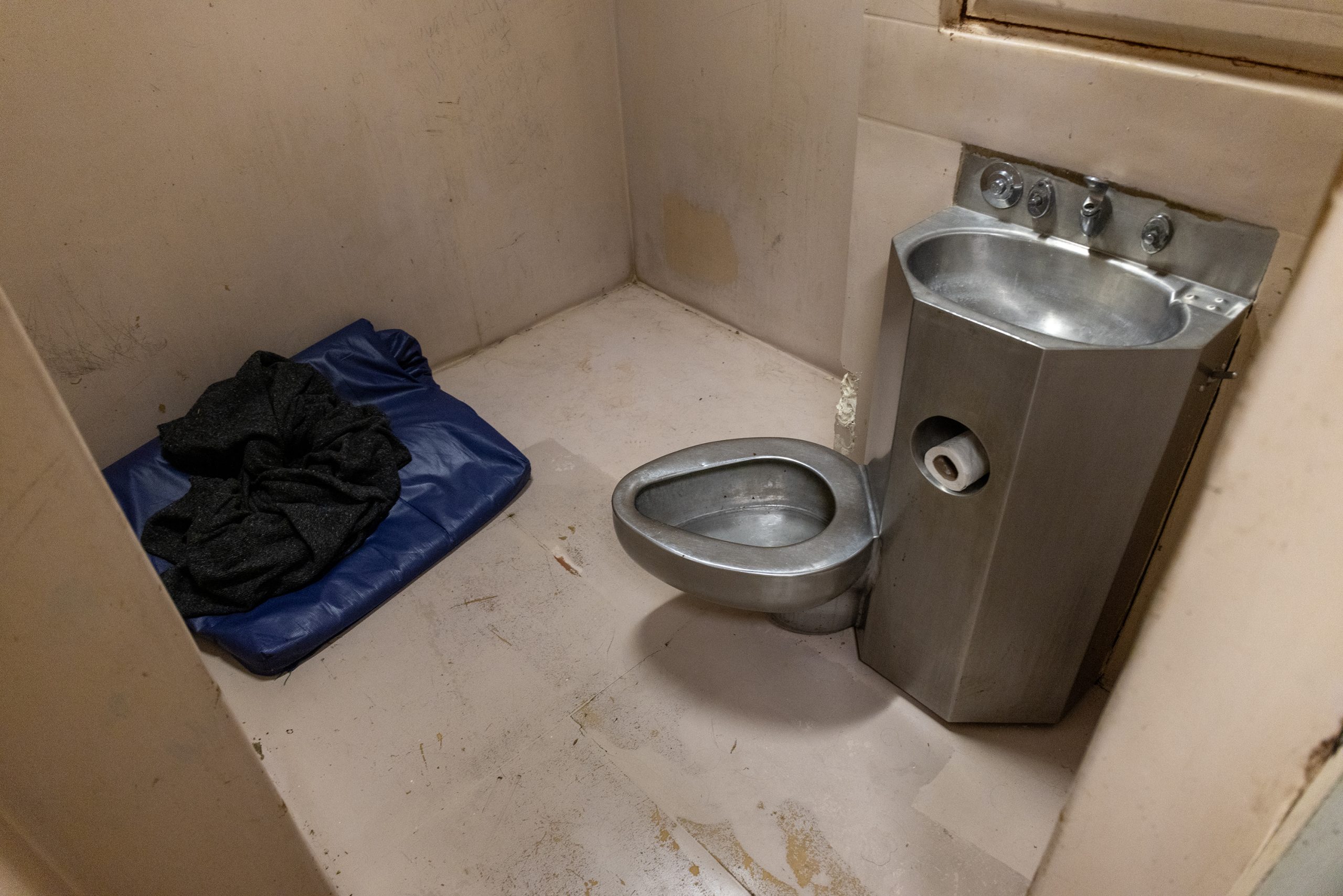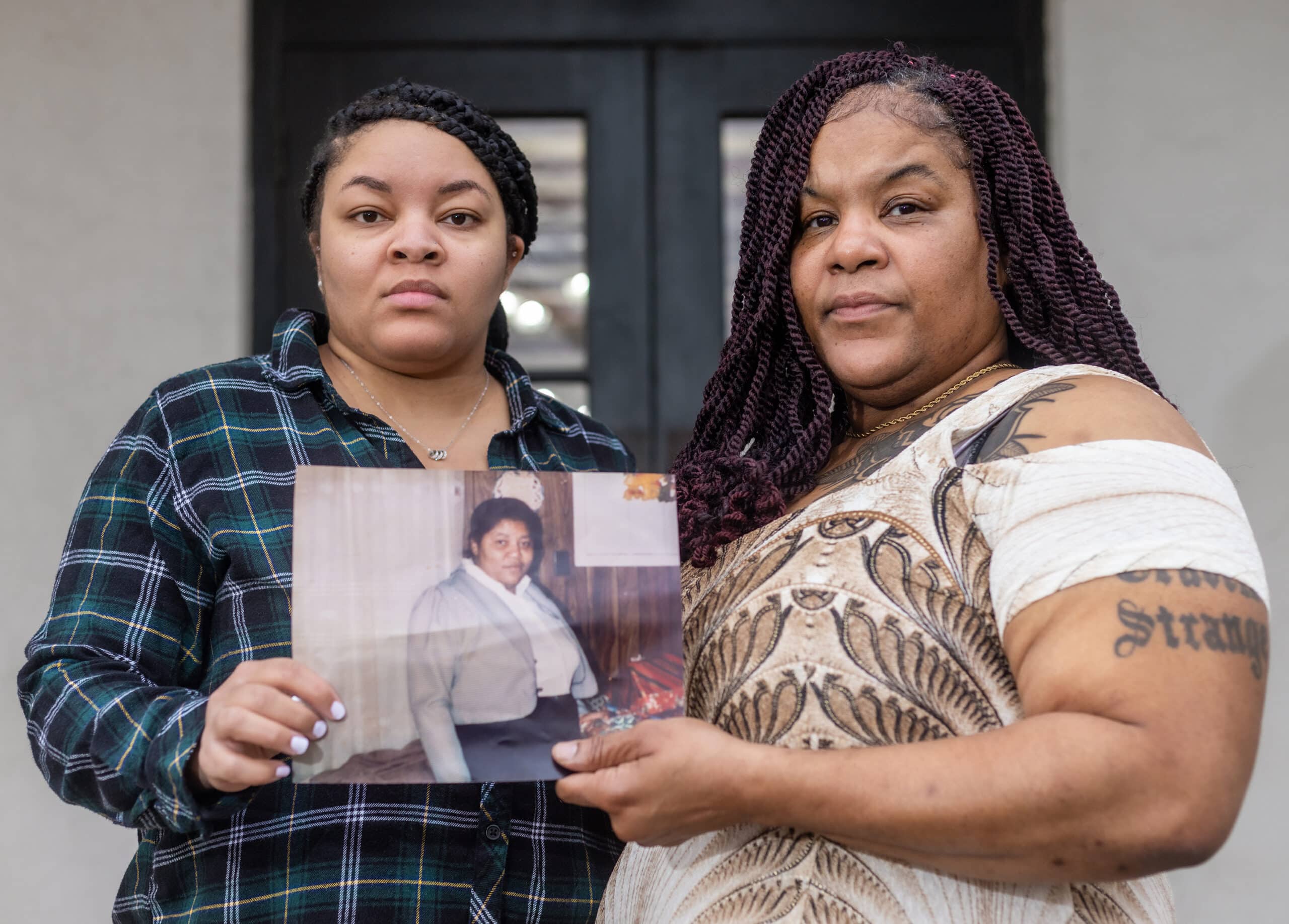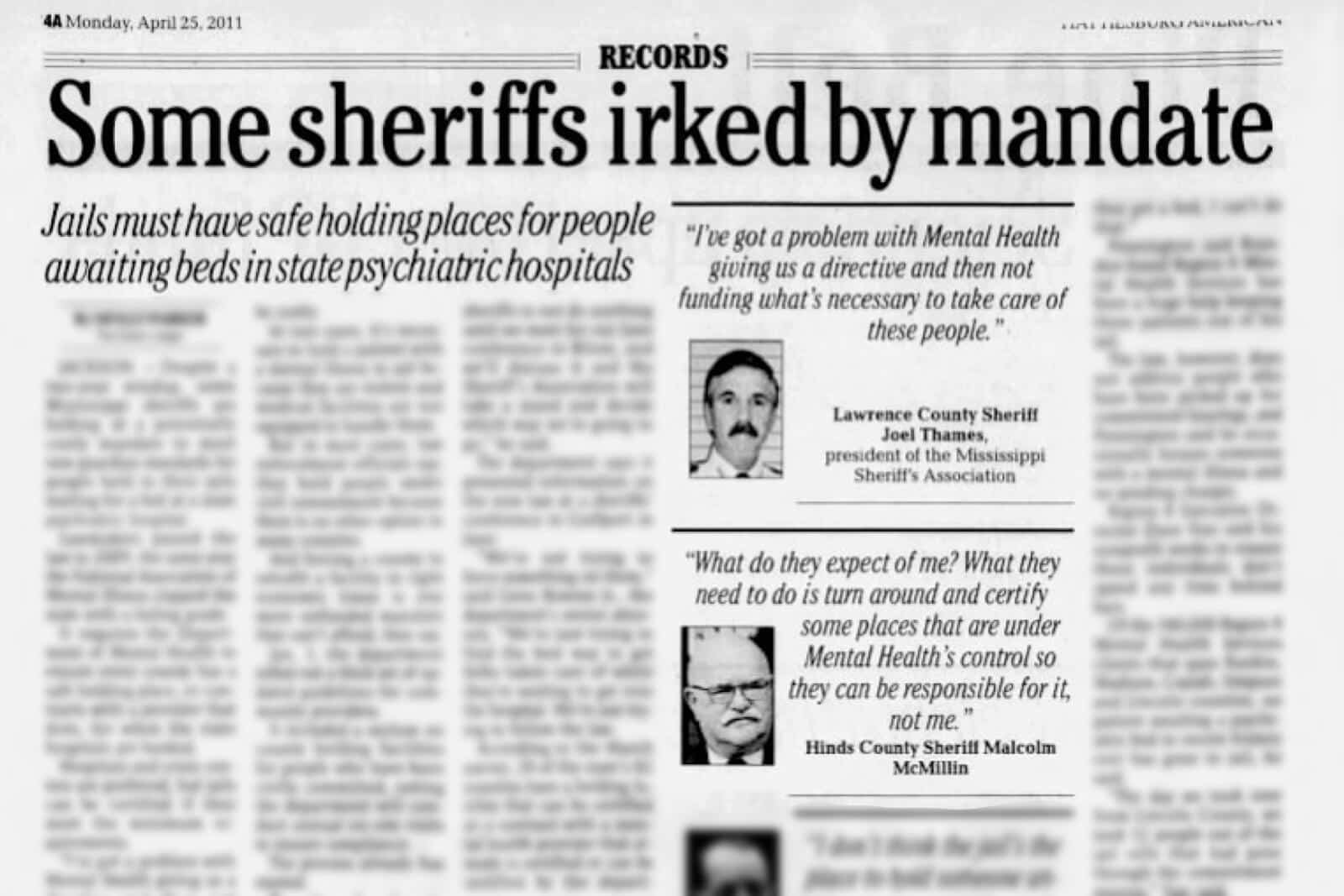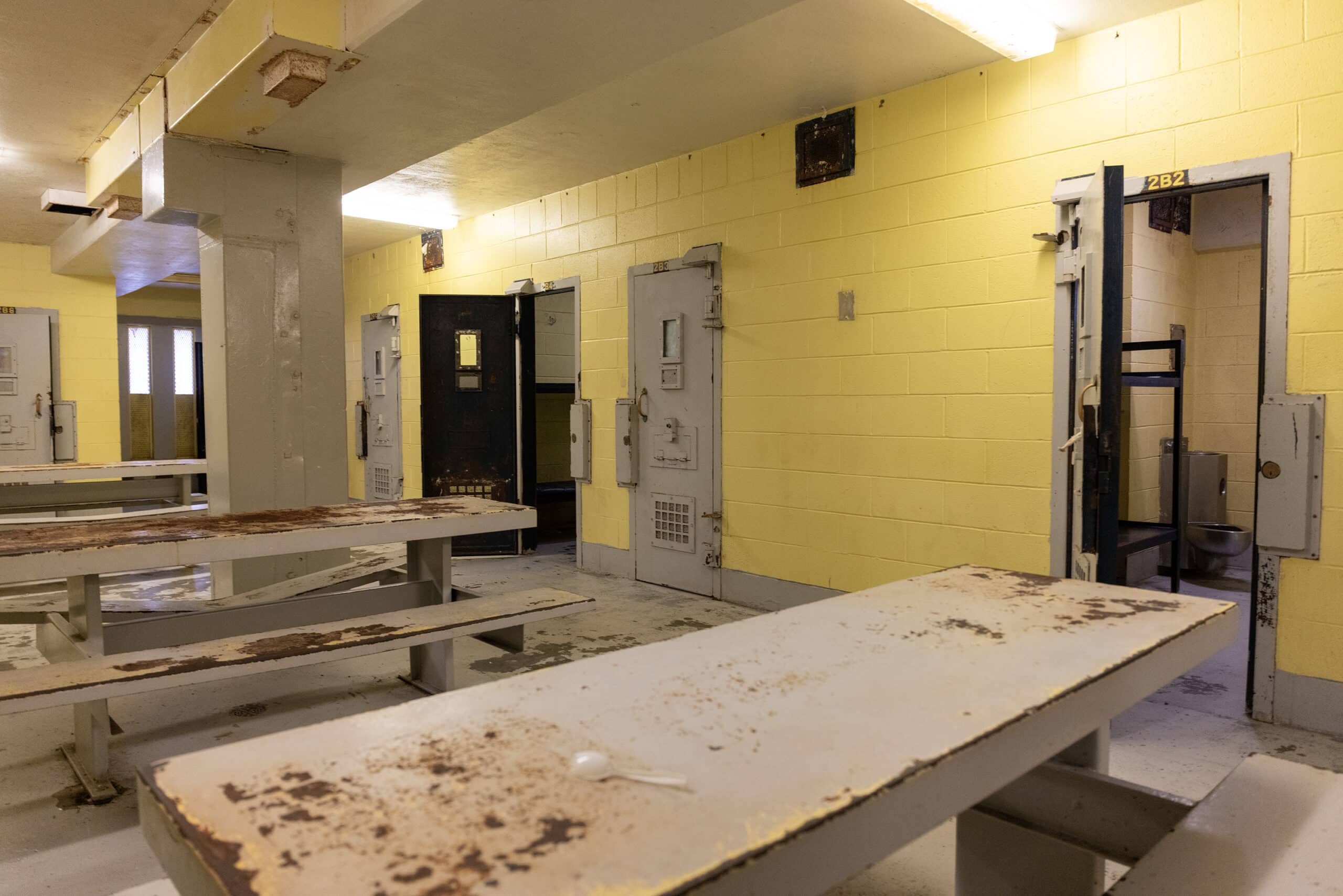Mississippi Today
Mississippi jailed more than 800 people awaiting psychiatric treatment in a year. Just one jail meets state standards.

This article was produced for ProPublica’s Local Reporting Network in partnership with Mississippi Today. Sign up for Dispatches to get stories like this one as soon as they are published.
In Mississippi, many people awaiting court-ordered treatment for mental illness or substance abuse are jailed, even though they haven’t been charged with a crime. Read our full series here.
Fourteen years ago, Mississippi legislators passed a law requiring county jails to be certified by the state if they held people awaiting court-ordered psychiatric treatment.
Today, just one jail in the state is certified.
And yet, from July 2022 to June 2023, more than 800 people awaiting treatment were jailed throughout the state, almost all in uncertified facilities, according to state data.
Mississippi Today and ProPublica have been reporting on county officials’ practice of jailing people with mental illness, most of whom haven’t been charged with a crime, as they await treatment under the state’s civil commitment law. After the news organizations started asking about the 2009 law earlier this year, the state attorney general’s office concluded that it is a “mandatory requirement” that the Mississippi Department of Mental Health certify the facilities where people are held after judges have ordered them into treatment.
The Department of Mental Health, which oversees the state’s behavioral health system and has no other responsibility for jails, responded by sending letters to county officials across the state encouraging them to stop holding people in uncertified jails. But the law provides no funding to help counties comply and no penalties if they don’t.

Under state law, counties are responsible for housing people going through the commitment process until they are admitted to a state hospital. Counties are allowed to put them in jail before their court hearings if there’s “no reasonable alternative.”
The last time the Department of Mental Health tried to ensure those jails met state standards, more than a decade ago, it had little success. After the law passed, the agency got to work to inform counties about the new rules. Some didn’t respond. Others expressed interest but didn’t follow through. By 2013, just two jails had been certified. (One of them no longer is.) After that, the effort apparently petered out, according to a review of state documents.
To be certified, a jail must offer on-call crisis care by a physician or psychiatric nurse practitioner and must have a supply of medications. Staff must be trained in crisis intervention and suicide prevention. People detained during the commitment process must be housed separately from people charged with crimes, in rooms free of fixtures or structures that could be used for self-harm, according to Department of Mental Health standards that took effect in 2011.
“If they’re going to be held in jail, they have to receive some kind of treatment in a semi-safe environment,” a department attorney told The Clarion-Ledger at the time.
Until recently, many county officials weren’t even aware of those requirements, according to interviews across the state — even though they were routinely jailing people solely because they might need mental health treatment. Mississippi appears to be the only state in the country where people awaiting treatment are commonly jailed without charges for days or weeks at a time.
Mississippi jails are subject to no statewide health and safety standards. Many jails treat people going through the civil commitment process virtually the same as those who have been charged with crimes, Mississippi Today and ProPublica found. They’re shackled and given jail uniforms. They’re often held in the same cells as criminal defendants. They receive minimal medical care. Some said they couldn’t access prescribed psychiatric medications. Since 1987, at least 18 people going through the commitment process for mental illness and substance abuse have died after being jailed, most of them by suicide.

Some local officials say getting certified could be expensive. Sheriffs worry it could codify their role as their county’s de facto mental health care provider.
“It looks like the state wants the sheriff to be the chief mental health officer,” said Will Allen, attorney for the Mississippi Sheriffs’ Association. “This is coming down to the state stuffing the cost of this down to the counties, and frankly I just think that’s wrong.”
‘Are you going to shut the jail down? No.’
The genesis of the 2009 law was a conversation state Sen. Joey Fillingane had with his girlfriend at the time, a social worker who worked with troubled youth. She told him that Mississippians going through the commitment process in some counties were locked in jail cells like criminals, while in other counties they were held in hospitals like patients, according to a 2011 news story in The Clarion-Ledger.
Fillingane’s bill addressed that. “Shouldn’t there be some kind of minimum standard where you’re holding people who haven’t committed a crime?” the Republican from Sumrall, near Hattiesburg, said in that story about his legislation.
His bill passed with little fanfare. It made it “illegal for individuals committed to a DMH behavioral health program to be held in jail unless it had been certified” as a holding facility, an agency staffer wrote in a timeline of the law’s implementation obtained by Mississippi Today and ProPublica.
The board overseeing the Department of Mental Health set detailed standards for those facilities. Department staff surveyed counties to see whether they could meet them.
Ed LeGrand was head of the department when the law passed. He said he viewed it as a progressive effort that could spur counties to stop holding mentally ill people in jail. And even if that didn’t happen, the law would improve jail conditions — at least somewhat.
“I didn’t think that everybody would be able to meet those standards. I thought they would give it a try,” he said in a recent interview. “A lot of them did, but some of them didn’t.”
Department staff met with county officials and toured jails to offer assistance. Those visits, which records show mostly took place in 2011 and 2012, were the first time the Department of Mental Health had tried to get a comprehensive look at the local facilities where Mississippians awaited psychiatric treatment in state hospitals, LeGrand said.
Many jails were poorly equipped to care for these people, according to notes by agency staff.
“Toured the current jail (scary),” reads a status update written after staff visited Tishomingo County, in the northeast corner of the state, shortly before the county opened a new jail. In Jones County in south Mississippi, where the jail had 180 inmates and only four staff: “The holding cells are not safe for violent behavior. Too much cement.”
Jones County Sheriff Joe Berlin said the cells have not changed since then, though now detainees are monitored with cameras.
In early 2011, LeGrand told county officials who hadn’t already begun the certification process that they had six months to find a certified provider to house people awaiting treatment.
Sheriffs were frustrated. Some objected to being told they had to upgrade their jails and train guards so they could care for mentally ill people they didn’t think they should be responsible for in the first place.
“What do they expect of me?” one sheriff was quoted as saying in the 2011 news story. “What they need to do is turn around and certify some places that are under Mental Health’s control so they can be responsible for it, not me.”

Some county officials concluded there was little the state could do if they didn’t comply. Mike Harlin, the jail administrator in Lamar County, discussed the standards with a Department of Mental Health staffer in 2012, according to an agency memo. In an interview this year, Harlin said he remembered thinking, “What are you going to do? Are you going to shut the jail down? No.”
By June 2013, jails in just two of the state’s 82 counties had been certified, according to the department’s tally. (A hospital was certified in another county, and a different type of facility was certified in a fourth.)
Six counties said they couldn’t meet the standards. Another 23 had received guidance from the department on how to meet them. Thirty, including a few of the counties that had received advice, eventually said they didn’t jail people, some because they had contracts with providers. Twenty-one never responded.
Mississippi Today and ProPublica requested all Department of Mental Health records since 2010 related to enforcement of the certification law and correspondence with counties. Documents through 2013 included standards, correspondence, memos describing visits to county facilities and a log summarizing contact with each county. After that, the records released show no statewide outreach.
The final entry in the department’s timeline of the law’s implementation reads: “June 2013 was the last attempt to update the information about DMH Designated Mental Health Holding Facilities due to lack of additional responses from the counties.” That timeline is undated, but a department spokesperson said data in the file shows that it was created in January 2015 by a staffer who held positions in the certification and behavioral health divisions.
LeGrand, who served until 2014, said he doesn’t recall any decision to stop contacting counties about the law.
Katie Storr, the current chief of staff at the Department of Mental Health, told Mississippi Today and ProPublica it’s possible staff did communicate with counties beyond what the records indicate. “After more than a decade, a lack of correspondence, email, or other documentation is not indicative that communication and follow-ups did not take place,” she wrote in an email. However, she said the department had no additional records that would show this.
During this time, Storr wrote, the department was focused on trying to get counties to hold people going through the commitment process in short-term crisis stabilization units rather than jail.
Department can’t ‘boss counties around’
The recent effort to implement the certification law stems from inquiries by Mississippi Today and ProPublica.
In January, the news organizations asked the head of the Department of Mental Health, Wendy Bailey, if the department certifies jails where people are held as they await admission to a state hospital. Bailey, who handled communications for the department when the certification law passed, initially said it didn’t apply to jails. In March, after reviewing documents showing prior efforts to certify jails, she said she didn’t believe the law was intended to apply to them.
After our inquiries, Bailey sought an opinion from the attorney general. (Such opinions are not binding, but officials who request and abide by them are protected from liability.)
Around the same time, the Department of Mental Health contacted the four facilities it had previously certified to schedule inspections. The department’s standards say such inspections will happen annually, but this was the first year in which staff had sought to visit all of them since 2017. (Storr said the inspection effort was planned before inquiries by Mississippi Today and ProPublica.)
In March, staffers inspecting the Chickasaw County jail in rural northeastern Mississippi found serious violations. Inmates and people awaiting mental health treatment were housed together in the same cells, where beds were anchored with long bolts that “could be used by a person to harm themselves,” the reviewers recorded.
The department suspended the jail’s certification in August, but reinstated it after the county submitted a compliance plan that included shortening the bolts and providing mental health training for staff.
Lafayette County told the state it didn’t want its jail to be certified anymore. The certification for a holding facility in Warren County, home to Vicksburg, was suspended. A hospital in Alcorn County in northeast Mississippi maintained its certification.

In August, the attorney general’s office confirmed that the department must “ensure that each county holding facility, including but not limited to county jails,” meets its standards. If they don’t, an assistant attorney general wrote, the law allows the department to require counties to contract with a county that does have a certified facility.
When Bailey informed county officials about the opinion in her October letter, she instructed that if a county holds someone in an uncertified facility, including a jail, officials should contact the department to seek certification or work with local community mental health centers. These are publicly funded, independent providers set up to ensure that poor, uninsured people can access mental health care.
Several counties, including Lamar, have taken up the matter in public meetings or have contacted the department to begin the certification process.
Storr told Mississippi Today and ProPublica that the department asked counties to initiate the certification process because the law says it’s up to counties to determine which facility they use.
But the Department of Mental Health already knows which counties have held people in uncertified jails. Starting in July 2021, in response to a federal lawsuit over the state’s mental health system, department staff have tracked how many people come to state hospitals directly from jails for psychiatric treatment.
The tally for the year ending in June breaks down all 71 jails, only one of which is certified, where a total of 812 people who had been civilly committed were held before being admitted to a state hospital. (The tally doesn’t include anyone who was jailed and released without being admitted to a state hospital.)

In Lauderdale County, on the Alabama line: 83. Across the state in DeSoto County: 76. A couple hundred miles down the Mississippi River in Adams County: 33.
Storr and Bailey have emphasized that they have limited authority over counties and no way to force them to do anything. The department’s only means of enforcement, Storr wrote, is to put a jail on probation, then revoke certification — if the jail in question even was certified in the first place — and require the county to contract with another provider.
LeGrand said a law without teeth is effectively optional. “The department’s not really in a good position to boss counties around,” he said.
James Tucker, an attorney and the director of the Alabama Disabilities Advocacy Program, which has sued that state over its civil commitment process, said the agency has a responsibility to make sure counties are treating people properly. “You don’t discharge that duty by sitting on your hands and waiting for every local sheriff to report in,” he said.
Bailey’s department encourages counties to connect families with outpatient services in order to avoid the commitment process. If someone does need to be committed, the department said, counties should hold people in crisis stabilization units operated by community mental health centers.
“I do not believe jails are an appropriate location to hold someone who is not charged with a crime and is awaiting admission to a treatment bed,” Bailey told Mississippi Today and ProPublica in an email. “The person should be in a safe location, receiving treatment.”

But there are only 180 crisis beds in the state, and crisis stabilization units frequently turn people away because they are full, can’t provide the needed care, or deem a patient too violent. Storr said the agency is working to reduce denials and plans to use one-time federal pandemic funding to expand capacity.
Allen, the sheriffs’ association attorney, said the state will need more crisis beds if officials want to keep people out of jail as they await mental health care. He said he’s been meeting with sheriffs and county officials since the guidance was issued.
“This has catalyzed the county governments and law enforcement to do something,” he said. Sheriffs agree on the need for “certified centers, just not in the county jail.”
Mollie Simon of ProPublica contributed research to this story.
This article first appeared on Mississippi Today and is republished here under a Creative Commons license.
Did you miss our previous article…
https://www.biloxinewsevents.com/?p=304973
Mississippi Today
Mississippi River flooding Vicksburg, expected to crest on Monday
Warren County Emergency Management Director John Elfer said Friday floodwaters from the Mississippi River, which have reached homes in and around Vicksburg, will likely persist until early May. Elfer estimated there areabout 15 to 20 roads underwater in the area.
“We’re about half a foot (on the river gauge) from a major flood,” he said. “But we don’t think it’s going to be like in 2011, so we can kind of manage this.”
The National Weather projects the river to crest at 49.5 feet on Monday, making it the highest peak at the Vicksburg gauge since 2020. Elfer said some residents in north Vicksburg — including at the Ford Subdivision as well as near Chickasaw Road and Hutson Street — are having to take boats to get home, adding that those who live on the unprotected side of the levee are generally prepared for flooding.



“There are a few (inundated homes), but we’ve mitigated a lot of them,” he said. “Some of the structures have been torn down or raised. There are a few people that still live on the wet side of the levee, but they kind of know what to expect. So we’re not too concerned with that.”
The river first reached flood stage in the city — 43 feet — on April 14. State officials closed Highway 465, which connects the Eagle Lake community just north of Vicksburg to Highway 61, last Friday.

Elfer said the areas impacted are mostly residential and he didn’t believe any businesses have been affected, emphasizing that downtown Vicksburg is still safe for visitors. He said Warren County has worked with the U.S. Army Corps of Engineers and the Mississippi Emergency Management Agency to secure pumps and barriers.
“Everybody thus far has been very cooperative,” he said. “We continue to tell people stay out of the flood areas, don’t drive around barricades and don’t drive around road close signs. Not only is it illegal, it’s dangerous.”
NWS projects the river to stay at flood stage in Vicksburg until May 6. The river reached its record crest of 57.1 feet in 2011.




This article first appeared on Mississippi Today and is republished here under a Creative Commons Attribution-NoDerivatives 4.0 International License.![]()
Mississippi Today
With domestic violence law, victims ‘will be a number with a purpose,’ mother says
Joslin Napier. Carlos Collins. Bailey Mae Reed.
They are among Mississippi domestic violence homicide victims whose family members carried their photos as the governor signed a bill that will establish a board to study such deaths and how to prevent them.
Tara Gandy, who lost her daughter Napier in Waynesboro in 2022, said it’s a moment she plans to tell her 5-year-old grandson about when he is old enough. Napier’s presence, in spirit, at the bill signing can be another way for her grandson to feel proud of his mother.
“(The board) will allow for my daughter and those who have already lost their lives to domestic violence … to no longer be just a number,” Gandy said. “They will be a number with a purpose.”
Family members at the April 15 private bill signing included Ashla Hudson, whose son Collins, died last year in Jackson. Grandparents Mary and Charles Reed and brother Colby Kernell attended the event in honor of Bailey Mae Reed, who died in Oxford in 2023.
Joining them were staff and board members from the Mississippi Coalition Against Domestic Violence, the statewide group that supports shelters and advocated for the passage of Senate Bill 2886 to form a Domestic Violence Facility Review Board.
The law will go into effect July 1, and the coalition hopes to partner with elected officials who will make recommendations for members to serve on the board. The coalition wants to see appointees who have frontline experience with domestic violence survivors, said Luis Montgomery, public policy specialist for the coalition.
A spokesperson from Gov. Tate Reeves’ office did not respond to a request for comment Friday.
Establishment of the board would make Mississippi the 45th state to review domestic violence fatalities.
Montgomery has worked on passing a review board bill since December 2023. After an unsuccessful effort in 2024, the coalition worked to build support and educate people about the need for such a board.
In the recent legislative session, there were House and Senate versions of the bill that unanimously passed their respective chambers. Authors of the bills are from both political parties.
The review board is tasked with reviewing a variety of documents to learn about the lead up and circumstances in which people died in domestic violence-related fatalities, near fatalities and suicides – records that can include police records, court documents, medical records and more.
From each review, trends will emerge and that information can be used for the board to make recommendations to lawmakers about how to prevent domestic violence deaths.
“This is coming at a really great time because we can really get proactive,” Montgomery said.
Without a board and data collection, advocates say it is difficult to know how many people have died or been injured in domestic-violence related incidents.
A Mississippi Today analysis found at least 300 people, including victims, abusers and collateral victims, died from domestic violence between 2020 and 2024. That analysis came from reviewing local news stories, the Gun Violence Archive, the National Gun Violence Memorial, law enforcement reports and court documents.
Some recent cases the board could review are the deaths of Collins, Napier and Reed.
In court records, prosecutors wrote that Napier, 24, faced increased violence after ending a relationship with Chance Fabian Jones. She took action, including purchasing a firearm and filing for a protective order against Jones.
Jones’s trial is set for May 12 in Wayne County. His indictment for capital murder came on the first anniversary of her death, according to court records.
Collins, 25, worked as a nurse and was from Yazoo City. His ex-boyfriend Marcus Johnson has been indicted for capital murder and shooting into Collins’ apartment. Family members say Collins had filed several restraining orders against Johnson.
Johnson was denied bond and remains in jail. His trial is scheduled for July 28 in Hinds County.
He was a Jackson police officer for eight months in 2013. Johnson was separated from the department pending disciplinary action leading up to immediate termination, but he resigned before he was fired, Jackson police confirmed to local media.
Reed, 21, was born and raised in Michigan and moved to Water Valley to live with her grandparents and help care for her cousin, according to her obituary.
Kylan Jacques Phillips was charged with first degree murder for beating Reed, according to court records. In February, the court ordered him to undergo a mental evaluation to determine if he is competent to stand trial, according to court documents.
At the bill signing, Gandy said it was bittersweet and an honor to meet the families of other domestic violence homicide victims.
“We were there knowing we are not alone, we can travel this road together and hopefully find ways to prevent and bring more awareness about domestic violence,” she said.
This article first appeared on Mississippi Today and is republished here under a Creative Commons Attribution-NoDerivatives 4.0 International License.
Mississippi Today
Court to rule on DeSoto County Senate districts with special elections looming
A federal three-judge panel will rule in coming days on how political power in northwest Mississippi will be allocated in the state Senate and whether any incumbents in the DeSoto County area might have to campaign against each other in November special elections.
The panel, comprised of all George W. Bush-appointed judges, ordered state officials last week to, again, craft a new Senate map for the area in the suburbs of Memphis. The panel has held that none of the state’s prior maps gave Black voters a realistic chance to elect candidates of their choice.
The latest map proposed by the all-Republican State Board of Election Commissioners tweaked only four Senate districts in northwest Mississippi and does not pit any incumbent senators against each other.
The state’s proposal would keep the Senate districts currently held by Sen. Michael McLendon, a Republican from Hernando and Sen. Kevin Blackwell, a Republican from Southaven, in majority-white districts.
But it makes Sen. David Parker’s district a slightly majority-Black district. Parker, a white Republican from Olive Branch, would run in a district with a 50.1% black voting-age population, according to court documents.
The proposal also maintains the district held by Sen. Reginald Jackson, a Democrat from Marks, as a majority-Black district, although it reduces the Black voting age population from 61% to 53%.
Gov. Tate Reeves, Secretary of State Michael Watson, and Attorney General Lynn Fitch comprise the State Board of Election Commissioners. Reeves and Watson voted to approve the plan. But Watson, according to meeting documents, expressed a wish that the state had more time to consider different proposals.
Fitch did not attend the meeting, but Deputy Attorney General Whitney Lipscomb attended in her place. Lipscomb voted against the map, although it is unclear why. Fitch’s office declined to comment on why she voted against the map because it involves pending litigation.
The reason for redrawing the districts is that the state chapter of the NAACP and Black voters in the state sued Mississippi officials for drawing legislative districts in a way that dilutes Black voting power.
The plaintiffs, represented by the ACLU, are likely to object to the state’s newest proposal, and they have until April 29 to file an objection with the court
The plaintiffs have put forward two alternative proposals for the area in the event the judges rule against the state’s plans.
The first option would place McLendon and Blackwell in the same district, and the other would place McLendon and Jackson in the same district.
It is unclear when the panel of judges will issue a ruling on the state’s plan, but they will not issue a ruling until the plaintiffs file their remaining court documents next week.
While the November election is roughly six months away, changing legislative districts across counties and precincts is technical work, and local election officials need time to prepare for the races.
The judges have not yet ruled on the full elections calendar, but U.S. Fifth Circuit Court of Appeals Judge Leslie Southwick said at a hearing earlier this month that the panel was committed have the elections in November.
This article first appeared on Mississippi Today and is republished here under a Creative Commons Attribution-NoDerivatives 4.0 International License.
-

 News from the South - Florida News Feed6 days ago
News from the South - Florida News Feed6 days agoJim talks with Rep. Robert Andrade about his investigation into the Hope Florida Foundation
-

 News from the South - Virginia News Feed7 days ago
News from the South - Virginia News Feed7 days agoHighs in the upper 80s Saturday, backdoor cold front will cool us down a bit on Easter Sunday
-

 News from the South - Arkansas News Feed7 days ago
News from the South - Arkansas News Feed7 days agoValerie Storm Tracker
-

 News from the South - Kentucky News Feed7 days ago
News from the South - Kentucky News Feed7 days agoU.S. Supreme Court pauses deportations under wartime law
-

 Mississippi Today5 days ago
Mississippi Today5 days ago‘Trainwreck on the horizon’: The costly pains of Mississippi’s small water and sewer systems
-

 News from the South - Alabama News Feed4 days ago
News from the South - Alabama News Feed4 days agoPrayer Vigil Held for Ronald Dumas Jr., Family Continues to Pray for His Return | April 21, 2025 | N
-

 News from the South - Texas News Feed5 days ago
News from the South - Texas News Feed5 days agoMeteorologist Chita Craft is tracking a Severe Thunderstorm Warning that's in effect now
-

 Mississippi Today7 days ago
Mississippi Today7 days agoOn this day in 1977, Alex Haley awarded Pulitzer for ‘Roots’














































